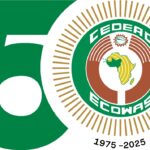ECOWAS: 50 Years of Building Regional Integration, Stability, and Transformation.
By Raymond Enoch
A Milestone in Regional Cooperation
Fifty years in the life of any institution is a milestone worthy of recognition and reflection. As the Economic Community of West African States (ECOWAS) commemorates its Golden Jubilee (1975–2025), no doubt stands as a pillar of regional integration, economic cooperation, and political stability in West Africa.
ECOWAS Founding Vision and Evolution
Established on May 28, 1975, with the signing of the Treaty of Lagos, ECOWAS aimed to promote economic integration among its Member States to foster regional development and stability. The original 15 signatories included Benin, Burkina Faso, Côte d’Ivoire, The Gambia, Ghana, Guinea, Guinea-Bissau, Liberia, Mali, Mauritania, Niger, Nigeria, Senegal, Sierra Leone, and Togo. Cabo Verde joined in 1977, while Mauritania withdrew in 2000.
Recognizing the evolving regional landscape, ECOWAS adopted a Revised Treaty in 1993, expanding its mandate beyond economic integration to include political stability, peace, security, and democratic governance.
ECOWAS Institutions: Strengthening Regional Frameworks
To effectively implement its mandate, ECOWAS has established key institutions that drive policies across various sectors, ensuring economic growth, political stability, and security cooperation:
ECOWAS Commission: The executive body responsible for policy coordination, regional programs, and administration.
ECOWAS Parliament: Serves as a forum for representation and dialogue, ensuring democratic participation in decision-making.
ECOWAS Court of Justice: Ensures the enforcement of ECOWAS legal texts and adjudicates human rights cases.
ECOWAS Bank for Investment and Development (EBID): Provides financial support for development projects within the region.
West African Health Organization (WAHO): Coordinates regional health policies, epidemic response, and public health programs.
ECOWAS Gender Development Centre: Promotes gender equality and women’s empowerment in the region.
West African Monetary Agency (WAMA): Works on monetary integration and the establishment of a single currency for West Africa.
West African Power Pool (WAPP): Aims to integrate national power systems into a unified regional electricity market.
ECOWAS Centre for Renewable Energy and Energy Efficiency (ECREEE): Promotes sustainable energy solutions in West Africa.
Inter-Governmental Action Group against Money Laundering in West Africa (GIABA): Focuses on combating money laundering and terrorist financing.
Key Achievements Over Five Decades
Throughout its 50-year of existence ECOWAS has made significant strides in various sectors of West Africa Region:
Economic Integration: Implementation of the ECOWAS Trade Liberalization Scheme (ETLS) and the adoption of a Common External Tariff (CET) have facilitated intra-regional trade. Efforts toward a single currency, the “ECO,” are ongoing, aiming to further harmonize economic activities.
Free Movement and Connectivity: Introduction of the ECOWAS passport and visa-free travel arrangements have enhanced mobility for citizens across member states. Infrastructure projects, such as the Lagos–Abidjan Corridor, have improved regional connectivity.
Peace and Security: ECOWAS has been proactive in conflict prevention and resolution, deploying peacekeeping missions in Liberia, Sierra Leone, Guinea-Bissau, and The Gambia. The establishment of the ECOWAS Standby Force and the Early Warning and Response Network (ECOWARN) underscores its commitment to regional stability.
Democracy and Governance: The organization has played a pivotal role in promoting democratic transitions, conducting election observations, and upholding constitutional order. The ECOWAS Protocol on Democracy and Good Governance sets standards for political governance in the region.
Health and Social Development: Through WAHO, ECOWAS has coordinated responses to health crises, including Ebola and COVID-19, and continues to work towards improving healthcare systems. Initiatives targeting youth and sports development, as well as gender equality, have also been prioritized.
The Next 50 Years
As ECOWAS celebrates its Golden Jubilee, it stands at a historic moment of reflecting on its past achievements while strategizing for future challenges with eyes fixed on its fundamental objectives. The path forward involves:
Deepening Economic Integration: Accelerating the implementation of the ECO currency and enhancing trade infrastructure to boost economic resilience.
Strengthening Political Cohesion across the region: Ensuring adherence to democratic principles and addressing emerging security threats collaboratively.
Promoting Sustainable Development: Investing in renewable energy, education, and healthcare to improve the quality of life for West African citizens.
Enhancing Institutional Capacity: Building robust and strong institutions that can effectively respond to the dynamic needs of the people of the region.
Strong Civil Society and vibrant citizenship that is capable of supporting the implementation of ECOWAS mandate including accelerated human rights and inclusive society.
ECOWAS’s journey over the past five decades showcases a commitment to unity, development, and peace. As it embarks on the next historic chapter, the institution remains dedicated to transforming West Africa into a region of prosperity and stability for all its people.









